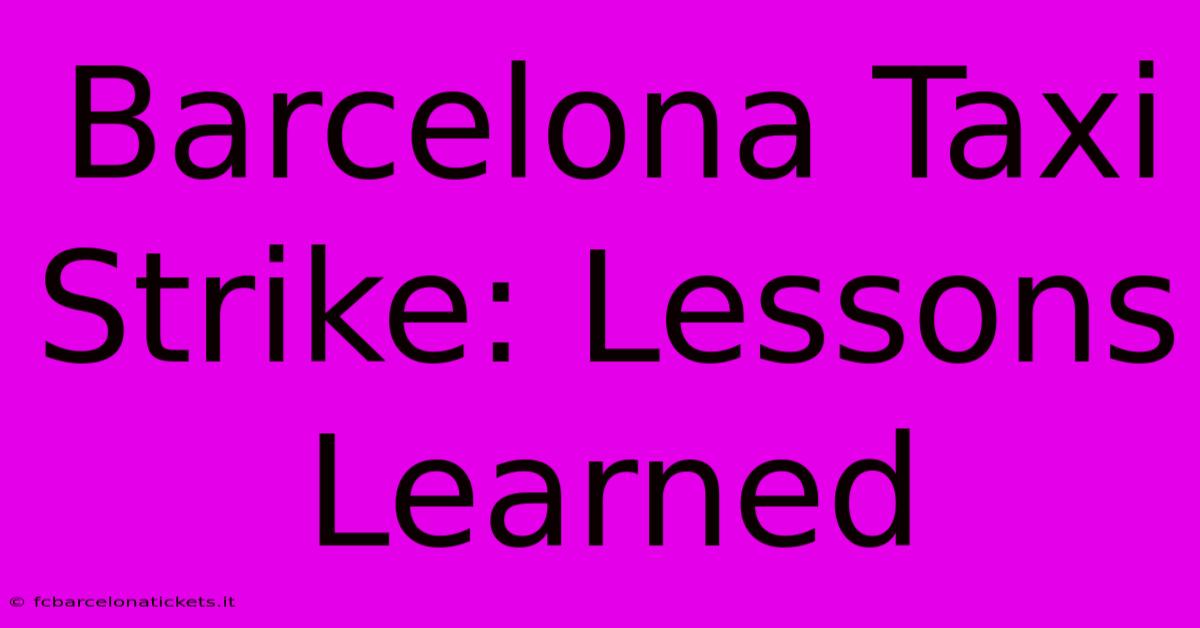Barcelona Taxi Strike: Lessons Learned

Table of Contents
Barcelona Taxi Strike: Lessons Learned
The recent taxi strike in Barcelona wasn't just a disruption to the city's transportation; it served as a stark reminder of the complexities of the gig economy and the power of collective action. This article delves into the key events, the underlying causes, and the valuable lessons learned from this significant labor dispute.
Understanding the Barcelona Taxi Strike
The Barcelona taxi strike, which saw significant disruption to the city, stemmed from deep-seated grievances among taxi drivers regarding the rise of ride-hailing apps like Uber and Cabify. Taxi drivers felt these apps were operating in a regulatory grey area, unfairly competing with them and undermining their livelihoods. Key grievances included:
- Unfair Competition: Taxi drivers argued that ride-hailing apps didn't adhere to the same regulations and licensing requirements as traditional taxis, creating an uneven playing field.
- Price Undercutting: The ability of ride-hailing apps to dynamically adjust prices, often undercutting traditional taxi fares, was a major point of contention.
- Lack of Regulation: Taxi drivers felt the existing regulatory framework was insufficient to address the challenges posed by ride-hailing services.
The Impact of the Strike
The strike brought Barcelona to a standstill, severely impacting tourism and daily life. The consequences included:
- Disruption to Tourism: Visitors struggled to get around, leading to negative reviews and potential damage to the city's reputation.
- Economic Losses: Businesses suffered from reduced foot traffic and lost revenue due to the transport disruption.
- Public Inconvenience: Residents faced significant difficulties in their daily commutes and accessing essential services.
Lessons Learned: Navigating the Gig Economy
The Barcelona taxi strike highlights critical issues facing the gig economy and its impact on traditional industries. Several key lessons emerge:
1. The Need for Clear Regulation
The strike underscored the urgent need for clear and comprehensive regulations governing ride-hailing apps. Regulations must address:
- Licensing and Permits: Ensuring that all ride-hailing services operate under the same licensing and permit requirements as traditional taxis.
- Pricing Transparency: Implementing mechanisms to prevent predatory pricing practices that undercut traditional taxi services.
- Driver Protections: Guaranteeing fair wages, benefits, and working conditions for ride-hailing drivers.
2. The Importance of Dialogue and Negotiation
The strike highlighted the failure of effective communication and negotiation between taxi drivers, ride-hailing companies, and the government. Future solutions require:
- Open Communication Channels: Establishing platforms for regular dialogue and negotiation between all stakeholders.
- Mediation and Arbitration: Utilizing independent mediators and arbitration processes to resolve disputes.
- Collaborative Problem-Solving: Fostering a collaborative approach to finding mutually acceptable solutions.
3. Adapting to Technological Change
The rise of ride-hailing apps represents a significant technological shift in the transportation sector. Adaptation requires:
- Technological Upgrades for Taxi Services: Investing in technology to enhance the taxi experience, such as mobile apps for booking and payment.
- Skills Development for Taxi Drivers: Providing training and support for taxi drivers to adapt to the changing landscape.
- Integration of Traditional and New Services: Exploring ways to integrate traditional taxi services with new technologies to improve efficiency and customer satisfaction.
Looking Ahead: A Path Forward
The Barcelona taxi strike serves as a cautionary tale and a valuable learning experience. By addressing the underlying issues of fair competition, adequate regulation, and effective dialogue, cities can prevent similar disruptions and create a more sustainable and equitable transportation system for both traditional taxi drivers and the burgeoning gig economy. The future of transportation will likely involve a blend of traditional and innovative services; finding a balance that benefits all stakeholders is crucial for maintaining a thriving and accessible urban environment. Ignoring these lessons learned risks repeating the disruption and negative consequences witnessed during the Barcelona taxi strike.

Thank you for visiting our website wich cover about Barcelona Taxi Strike: Lessons Learned. We hope the information provided has been useful to you. Feel free to contact us if you have any questions or need further assistance. See you next time and dont miss to bookmark.
Featured Posts
-
The Ultimate Fan Gear Xavi Jersey
Apr 02, 2025
-
Show Your Barca Loyalty Ronaldinho Long Sleeve
Apr 02, 2025
-
Beat The Rush Visit Barcelona In October
Apr 02, 2025
-
Uncover The Secrets Of El Borns Scents Carner Barcelona
Apr 02, 2025
-
Nyc To Barcelona Minimize Your Travel Time
Apr 02, 2025
